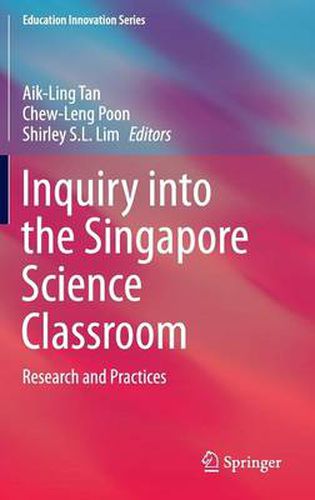Readings Newsletter
Become a Readings Member to make your shopping experience even easier.
Sign in or sign up for free!
You’re not far away from qualifying for FREE standard shipping within Australia
You’ve qualified for FREE standard shipping within Australia
The cart is loading…






This title is printed to order. This book may have been self-published. If so, we cannot guarantee the quality of the content. In the main most books will have gone through the editing process however some may not. We therefore suggest that you be aware of this before ordering this book. If in doubt check either the author or publisher’s details as we are unable to accept any returns unless they are faulty. Please contact us if you have any questions.
This book offers an insight into the research and practices of science teaching and learning in the Singapore classroom, with particular attention paid to how they map on to science as inquiry. It provides a spectrum of Singapore’s science educational practices through all levels of its education system, detailing both successes and shortcomings.
The book features a collection of research and discourse by science educators in Singapore, organized around four themes that are essential components of approaching science as inquiry: teachers’ ideas and their practices, opportunities and constraints from a systemic level, students’ competencies and readiness to learn through inquiry and the need for greater awareness of the role of informal learning avenues in science education. In addition, the discourse within each theme is enriched by commentary from a leading international academic, which helps to consolidate ideas as well as position the issues within a wider theoretical and international context.
Overall, the papers set out important contexts for readers to understand the current state of science education in Singapore. They also highlight strengths and gaps in practices of science as inquiry as well as provide suggestions about how the system can be improved. These research findings are therefore helpful as they provide honest and evidence-based feedback as well as tangible and doable ideas that policy makers, teachers, students and school administrators can adopt, adapt and enhance.
$9.00 standard shipping within Australia
FREE standard shipping within Australia for orders over $100.00
Express & International shipping calculated at checkout
This title is printed to order. This book may have been self-published. If so, we cannot guarantee the quality of the content. In the main most books will have gone through the editing process however some may not. We therefore suggest that you be aware of this before ordering this book. If in doubt check either the author or publisher’s details as we are unable to accept any returns unless they are faulty. Please contact us if you have any questions.
This book offers an insight into the research and practices of science teaching and learning in the Singapore classroom, with particular attention paid to how they map on to science as inquiry. It provides a spectrum of Singapore’s science educational practices through all levels of its education system, detailing both successes and shortcomings.
The book features a collection of research and discourse by science educators in Singapore, organized around four themes that are essential components of approaching science as inquiry: teachers’ ideas and their practices, opportunities and constraints from a systemic level, students’ competencies and readiness to learn through inquiry and the need for greater awareness of the role of informal learning avenues in science education. In addition, the discourse within each theme is enriched by commentary from a leading international academic, which helps to consolidate ideas as well as position the issues within a wider theoretical and international context.
Overall, the papers set out important contexts for readers to understand the current state of science education in Singapore. They also highlight strengths and gaps in practices of science as inquiry as well as provide suggestions about how the system can be improved. These research findings are therefore helpful as they provide honest and evidence-based feedback as well as tangible and doable ideas that policy makers, teachers, students and school administrators can adopt, adapt and enhance.